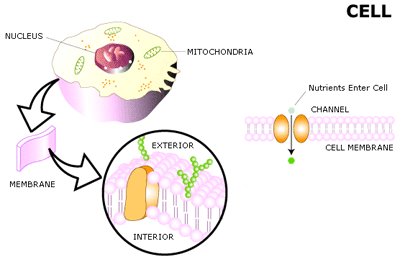

Whilst there are many ways to maintain your energy, such as consuming a balanced diet, getting sufficient sleep and exercising regularly, these things are not always possible for some people. In times like these, food supplements may help support your overall energy requirements
Acetyl Coenzyme A (Acetyl-CoA) is an important molecule in metabolism. It delivers the acetyl group to the Citric acid/
Krebs cycle, releasing ATP (energy) and forming carbon dioxide and water. It is important to have enough acetyl-CoA to feed into the citric acid cycle to provide energy.
Alpha-lipoic acid (ALA), also known as lipoic acid or thioctic acid, acts as an antioxidant and is naturally present in the mitochondria. Alpha lipoic acid serves as a cofactor for enzymes that participate in cell metabolism that produce ATP. It acts as an antioxidant by scavenging free radicals. Whilst the body can make sufficient ALA for basic energy metabolism it only acts as an antioxidant when it’s there in larger amounts as discussed in this paper on Alpha-lipoic acid as a dietary supplement.
Arginine is involved in many metabolic processes, as explored in this paper Novel metabolic roles of L-arginine in body energy metabolism and possible clinical applications. These processes include protein metabolism and creatine synthesis. Arginine is also the precursor of nitric oxide (NO), an important neurotransmitter and vasodilator. It is reported that supplementation with L Arginine may increase ATP regeneration via activation of AMP Kinase pathway.
Ashwagandha, whilst not classed as an energy booster, can have an effect on physical and mental performance. It is used as a general tonic (to help maintain optimal stamina, feelings of energy and vitality), adaptogen and an antioxidant.
Adaptogens are non-toxic plants that help support the body resist stress, whether it be physical, chemical or biological.
Ashwagandha also helps maintain mental balance and supports learning, memory and recall. Ashwagandha may help lower cortisol levels (the hormone released in stressful situations) in chronically stressed individuals, according to this paper on the study of ashwagandha root in reducing stress and anxiety in adults.
B Complex liquid or B Complex capsules includes a blend of all the B vitamins, which are water soluble and have roles in supporting your normal energy yielding processes. You can read more about our B Complex product in our Vitamin B
Complex article.
Carnitine has an important role in energy metabolism by transferring long chain fatty acids into the mitochondria for beta-oxidation. It also aids with the removal of acetyl Coenzyme A metabolites by binding to them for excretion in the urine.
Carnitine is the generic term for a number of compounds that include L-carnitine and acetyl-L-carnitine. Animal products like meat, fish, poultry are the best sources of carnitine. A decline in mitochondrial function is thought to contribute to the aging process. This research paper on carnitine , found that supplementing with high doses of acetyl-L-carnitine and alpha-lipoic acid reduced mitochondrial decay.
Coenzyme Q10 (CoQ10) transfers electrons in the electron transport chain as part of ATP production. In its reduced form, it is a powerful antioxidant. It is particularly important in cells that have high-energy requirements such as those of the heart that are particularly sensitive to CoQ10 deficiency. As CoQ10 is lipid or fat soluble, it is advisable to take this product with a meal containing fat. It is found in many foods such as heart, liver, kidney, spinach, cauliflower and broccoli etc. CoQ10 declines with age and when levels of CoQ10 decline, as shown in this 2014 research on CoQ10, your cells cannot produce the energy they need and this can result in fatigue.
Iodine. The thyroid gland traps iodine from the blood as it is needed to form thyroxine (T4) and Triiodothyronine (T3).
These are thyroid hormones and are essential for normal thyroid function. Thyroid hormones help the body make energy.
When levels of thyroid hormones are low, the body can’t make as much energy as it usually does. Deficiency of iodine can therefore result in fatigue and weakness. Good food sources of Iodine are shellfish and sea fish as well as in the plant-based foods such as cereals and grains.
Iron is an essential mineral that contributes to normal energy-yielding metabolism. The body needs iron to make haemoglobin, which is the protein in red blood cells that transports oxygen throughout your body. Iron deficiency (anaemia) can leave you feeling fatigued and weak. Vitamin C is included in the Metabolics Iron and Vitamin C formulation as it increases the bioavailability of iron.
Magnesium has a predominant role in the production and use of ATP, as it forms Mg-ATP complexes. These complexes are cofactors for several kinases that are active during glycolysis. Magnesium also regulates the activity of several enzymes involved in the Citric acid/Krebs cycle. You can read more about magnesium and its functions in the
Practitioner’s Guide to Magnesium.
Niacin, also known as Vitamin B3 is a precursor of the coenzymes nicotinamide adenine dinucleotide (NAD) and NAD phosphate (NADP), which are involved in many metabolic reactions. NAD and its reduced form NADH play an important role in energy metabolism by transferring electrons in the mitochondrial electron transport chain. Niacin also has antioxidant properties and prevents oxidative stress. Foods high in niacin include liver, chicken, tuna, salmon, avocado, brown rice and peanuts.
Riboflavin, also known as vitamin B2 is a component of the flavoproteins flavin adenine dinucleotide (FAD) and flavin mononucleotide (FMN). These act as electron carriers in the mitochondrial electron transport chain and are involved in fatty acid oxidation and the Citric acid/Krebs cycle therefore contribute to normal energy yielding metabolism.
Riboflavin is found naturally in eggs, lean meats, green vegetables and fortified cereals.Ribose is an important sugar that is an important component of the nucleotide RNA. It is an energy source made from food and is the fuel for mitochondria to produce ATP which provides cellular energy. Some research, which looks at the effect of ribose supplementation on resynthesis of adenine nucleotides after intense intermittent training suggests D-Ribose supplements may help recover stores of ATP in muscle cells. Typical foods containing ribose include mushrooms, cheese, milk, and eggs.
Thiamine, also known as Vitamin B1 contributes to your normal energy yielding metabolism. Thiamine Hydrochloride is the salt form of thiamine, essential for aerobic metabolism, cell growth, transmission of nerve impulses and acetylcholine synthesis. When it is hydrolysed, thiamine hydrochloride is phosphorylated to the active form thiamine pyrophosphate.
This is a coenzyme for many enzymatic activities involving fatty acid, amino acid and carbohydrate metabolism. When glucose is broken down into energy, thiamine is a cofactor in the process of converting pyruvate to acetyl coenzyme A.
Pyruvate is critical for numerous aspects of human metabolism, something that is explored in this research on the regulation of pyruvate metabolism and human disease. Thiamine is found naturally in many foods including whole grains, pasta, rice, pork, fish, legumes, seeds and nuts.
Vitamin C, also known as L-Ascorbic acid contributes to normal energy-yielding metabolism. It acts as an antioxidant that has the ability to regenerate other antioxidants. Vitamin C also facilitates the intestinal absorption of nonheme iron, as is detailed in this research on vitamin C function. People are unable to synthesize vitamin C endogenously, so it is an essential dietary component. Foods rich in vitamin C include broccoli, cantaloupe, cauliflower, kale, kiwi, orange juice, papaya, red, green or yellow pepper, sweet potato, strawberries, and tomatoes.
Vitamin E is a fat soluble compound with antioxidant activities, helping protect cells from the damage caused by free radicals. Free radicals are compounds formed when our bodies convert the food we eat into energy. Naturally occurring vitamin E has eight chemical forms, known as vitamin E tocotrienols, (alpha-, beta-, gamma-, and delta-tocopherol and alpha-, beta-, gamma, and delta-tocotrienol). Nuts, seeds, and some oils tend to contain the most vitamin E per serving.
Vitamin K is a fat soluble cofactor for enzymes involved in blood clotting and bone metabolism. It acts as an antioxidant and can donate electrons. There are two forms, K1 and K2, distinguishable by two main structures phylloquinone (K1) and menaquinones (K2). A 2019 review on the differences between K1 and K2 suggests that the body can absorb up to ten times more vitamin K2, as MK7, than vitamin K1. Vitamin K2, is only found in animal sourced foods and fermented plant foods, such as natto.
Conclusion
Metabolics offers a range of food supplements to support your nutritional needs and energy requirements. Whilst the best way to do this is through a well-balanced diet, exercise, reduce your exposure to stress and ensure you get plenty of sleep, our supplements are there to provide high quality ingredients to support you along the way.
If pregnant, breast feeding or taking medication it is advised that you consult with a health care practitioner before using these products.
POSTED BY: ALISON ASTILL SMITH
2nd February 2022
Healthy Cells in Body
